Unit2 Go for it!知识点总结与练习(含参考答案) 外研版(2024)英语七年级下册
文档属性
| 名称 | Unit2 Go for it!知识点总结与练习(含参考答案) 外研版(2024)英语七年级下册 | 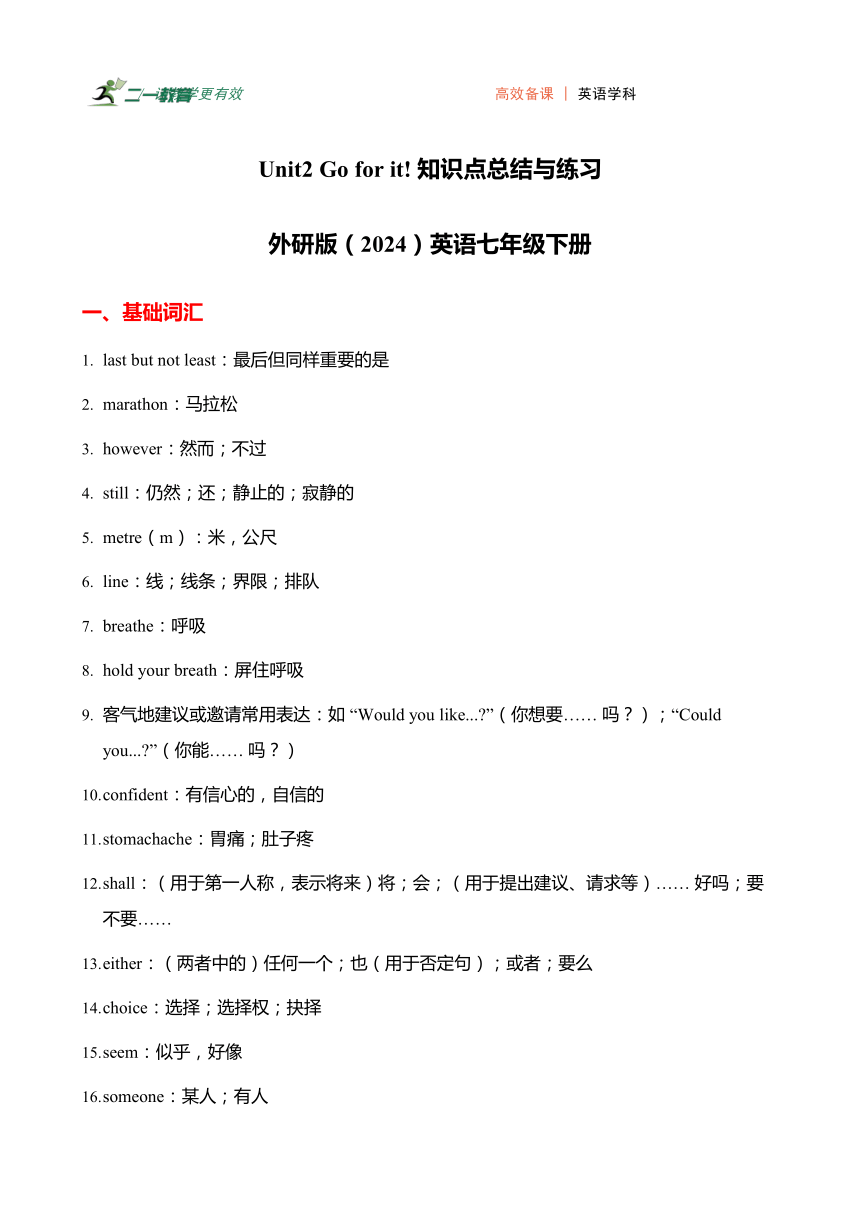 | |
| 格式 | docx | ||
| 文件大小 | 284.1KB | ||
| 资源类型 | 试卷 | ||
| 版本资源 | 外研版 | ||
| 科目 | 英语 | ||
| 更新时间 | 2025-02-10 14:19:40 | ||
图片预览

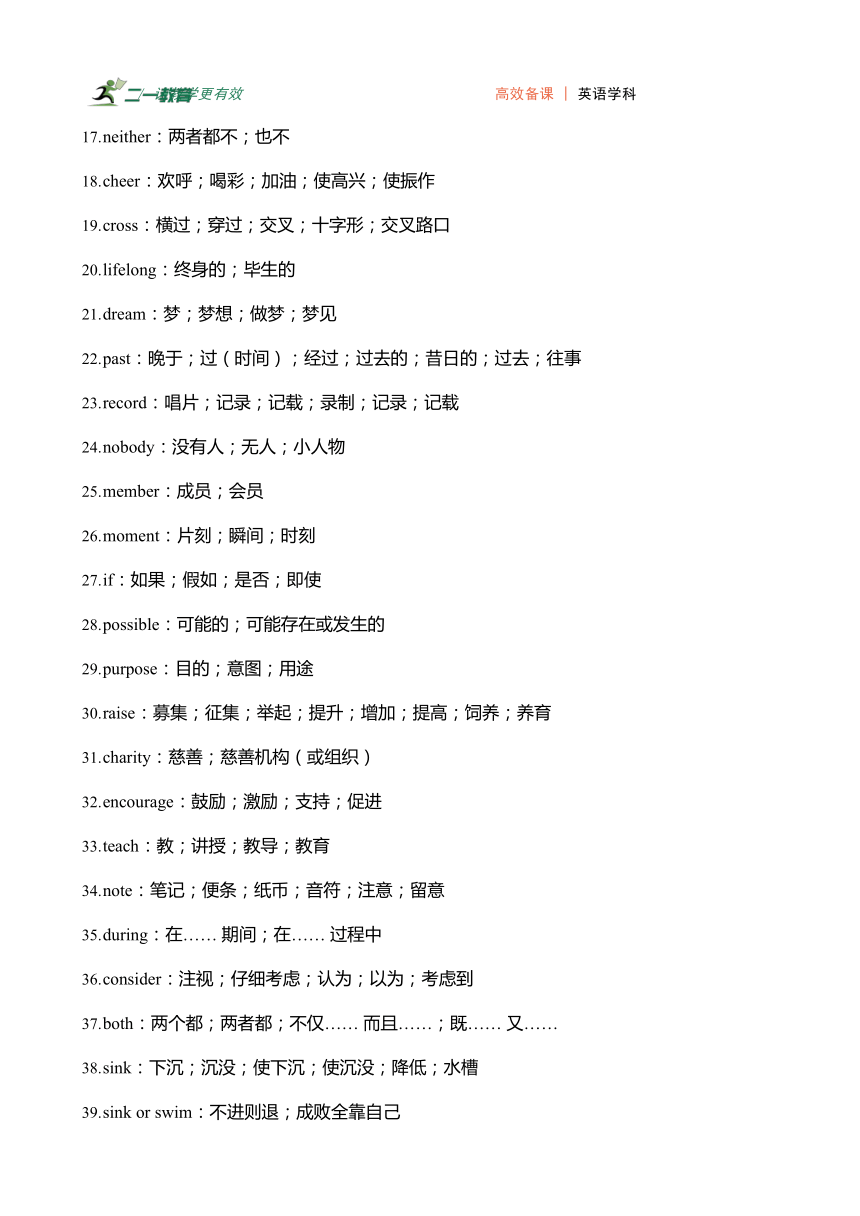
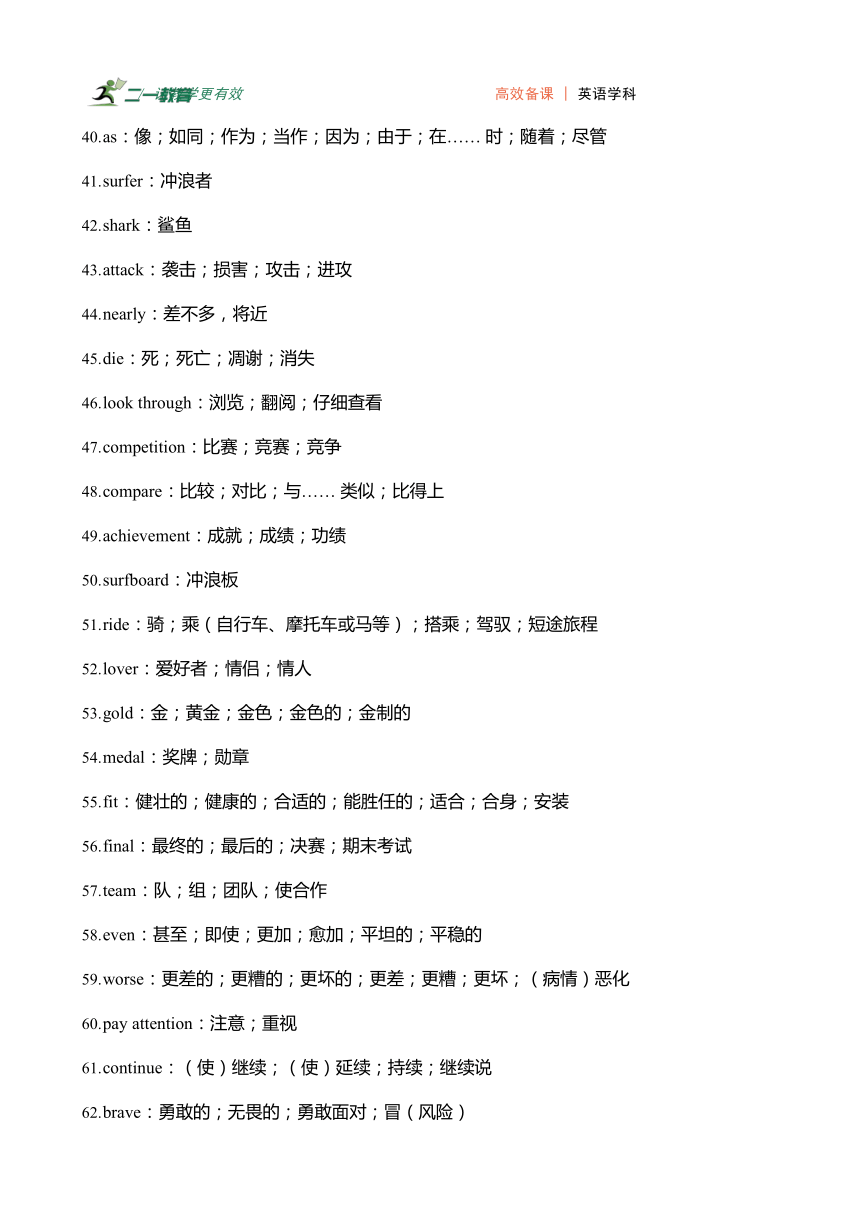
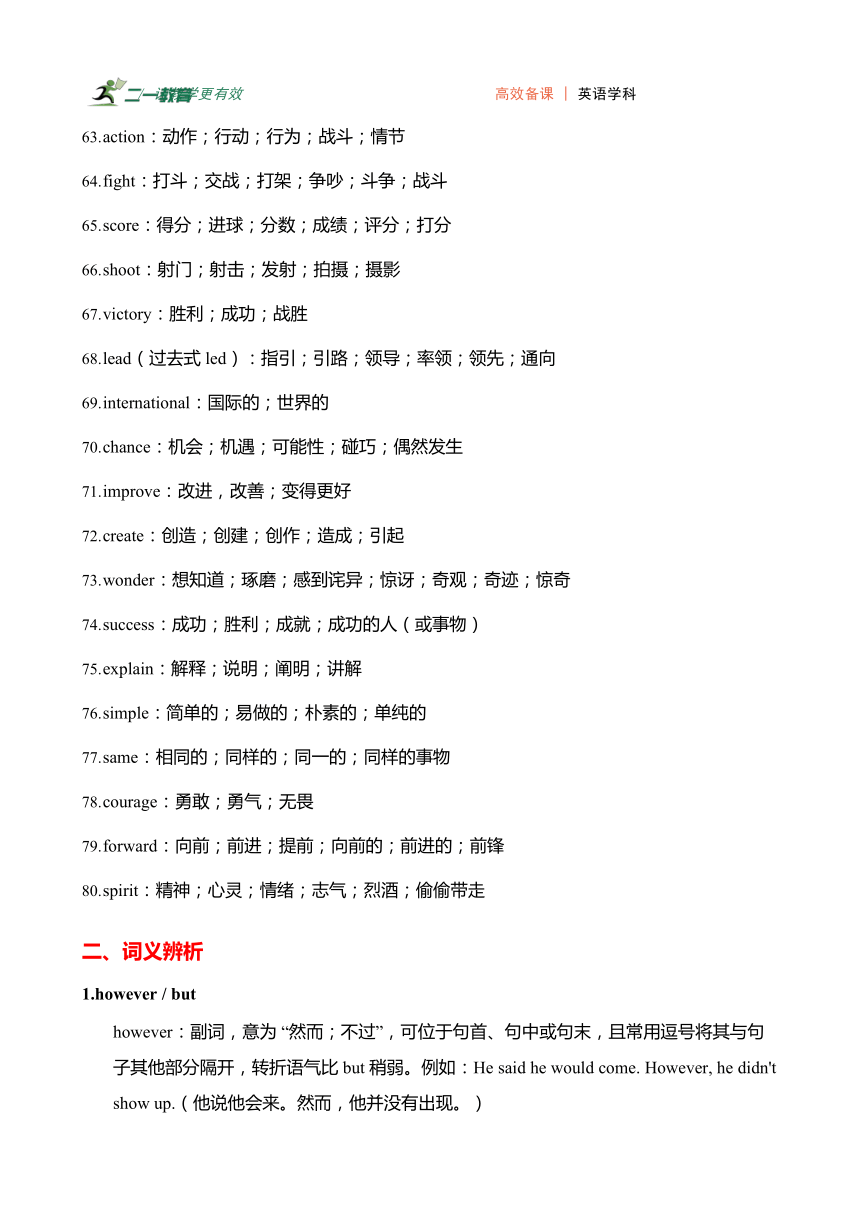
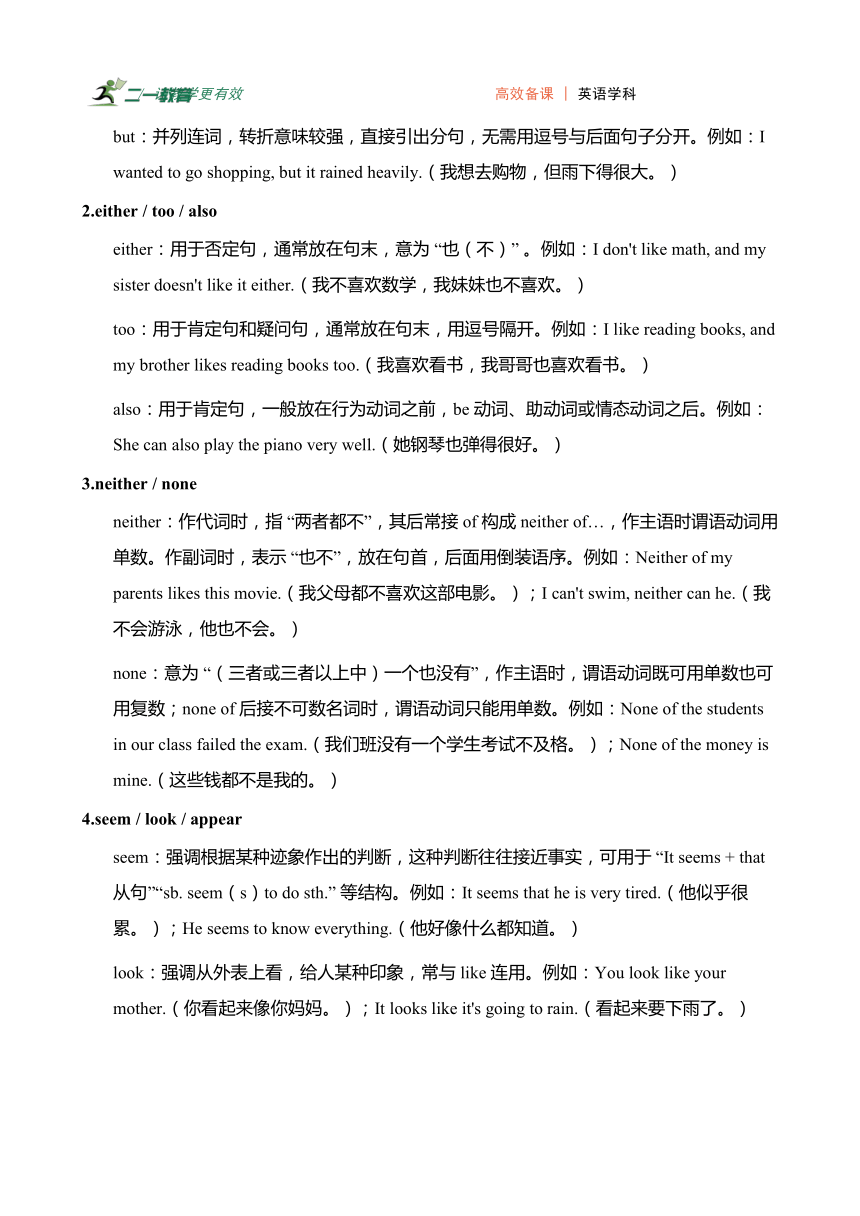
文档简介
/ 让教学更有效 高效备课 | 英语学科
Unit2 Go for it! 知识点总结与练习
外研版(2024)英语七年级下册
一、基础词汇
last but not least:最后但同样重要的是
marathon:马拉松
however:然而;不过
still:仍然;还;静止的;寂静的
metre(m):米,公尺
line:线;线条;界限;排队
breathe:呼吸
hold your breath:屏住呼吸
客气地建议或邀请常用表达:如 “Would you like... ”(你想要…… 吗?);“Could you... ”(你能…… 吗?)
confident:有信心的,自信的
stomachache:胃痛;肚子疼
shall:(用于第一人称,表示将来)将;会;(用于提出建议、请求等)…… 好吗;要不要……
either:(两者中的)任何一个;也(用于否定句);或者;要么
choice:选择;选择权;抉择
seem:似乎,好像
someone:某人;有人
neither:两者都不;也不
cheer:欢呼;喝彩;加油;使高兴;使振作
cross:横过;穿过;交叉;十字形;交叉路口
lifelong:终身的;毕生的
dream:梦;梦想;做梦;梦见
past:晚于;过(时间);经过;过去的;昔日的;过去;往事
record:唱片;记录;记载;录制;记录;记载
nobody:没有人;无人;小人物
member:成员;会员
moment:片刻;瞬间;时刻
if:如果;假如;是否;即使
possible:可能的;可能存在或发生的
purpose:目的;意图;用途
raise:募集;征集;举起;提升;增加;提高;饲养;养育
charity:慈善;慈善机构(或组织)
encourage:鼓励;激励;支持;促进
teach:教;讲授;教导;教育
note:笔记;便条;纸币;音符;注意;留意
during:在…… 期间;在…… 过程中
consider:注视;仔细考虑;认为;以为;考虑到
both:两个都;两者都;不仅…… 而且……;既…… 又……
sink:下沉;沉没;使下沉;使沉没;降低;水槽
sink or swim:不进则退;成败全靠自己
as:像;如同;作为;当作;因为;由于;在…… 时;随着;尽管
surfer:冲浪者
shark:鲨鱼
attack:袭击;损害;攻击;进攻
nearly:差不多,将近
die:死;死亡;凋谢;消失
look through:浏览;翻阅;仔细查看
competition:比赛;竞赛;竞争
compare:比较;对比;与…… 类似;比得上
achievement:成就;成绩;功绩
surfboard:冲浪板
ride:骑;乘(自行车、摩托车或马等);搭乘;驾驭;短途旅程
lover:爱好者;情侣;情人
gold:金;黄金;金色;金色的;金制的
medal:奖牌;勋章
fit:健壮的;健康的;合适的;能胜任的;适合;合身;安装
final:最终的;最后的;决赛;期末考试
team:队;组;团队;使合作
even:甚至;即使;更加;愈加;平坦的;平稳的
worse:更差的;更糟的;更坏的;更差;更糟;更坏;(病情)恶化
pay attention:注意;重视
continue:(使)继续;(使)延续;持续;继续说
brave:勇敢的;无畏的;勇敢面对;冒(风险)
action:动作;行动;行为;战斗;情节
fight:打斗;交战;打架;争吵;斗争;战斗
score:得分;进球;分数;成绩;评分;打分
shoot:射门;射击;发射;拍摄;摄影
victory:胜利;成功;战胜
lead(过去式 led):指引;引路;领导;率领;领先;通向
international:国际的;世界的
chance:机会;机遇;可能性;碰巧;偶然发生
improve:改进,改善;变得更好
create:创造;创建;创作;造成;引起
wonder:想知道;琢磨;感到诧异;惊讶;奇观;奇迹;惊奇
success:成功;胜利;成就;成功的人(或事物)
explain:解释;说明;阐明;讲解
simple:简单的;易做的;朴素的;单纯的
same:相同的;同样的;同一的;同样的事物
courage:勇敢;勇气;无畏
forward:向前;前进;提前;向前的;前进的;前锋
spirit:精神;心灵;情绪;志气;烈酒;偷偷带走
二、词义辨析
1.however / but
however:副词,意为 “然而;不过”,可位于句首、句中或句末,且常用逗号将其与句子其他部分隔开,转折语气比 but 稍弱。例如:He said he would come. However, he didn't show up.(他说他会来。然而,他并没有出现。)
but:并列连词,转折意味较强,直接引出分句,无需用逗号与后面句子分开。例如:I wanted to go shopping, but it rained heavily.(我想去购物,但雨下得很大。)
2.either / too / also
either:用于否定句,通常放在句末,意为 “也(不)” 。例如:I don't like math, and my sister doesn't like it either.(我不喜欢数学,我妹妹也不喜欢。)
too:用于肯定句和疑问句,通常放在句末,用逗号隔开。例如:I like reading books, and my brother likes reading books too.(我喜欢看书,我哥哥也喜欢看书。)
also:用于肯定句,一般放在行为动词之前,be 动词、助动词或情态动词之后。例如:She can also play the piano very well.(她钢琴也弹得很好。)
3.neither / none
neither:作代词时,指 “两者都不”,其后常接 of 构成 neither of…,作主语时谓语动词用单数。作副词时,表示 “也不”,放在句首,后面用倒装语序。例如:Neither of my parents likes this movie.(我父母都不喜欢这部电影。);I can't swim, neither can he.(我不会游泳,他也不会。)
none:意为 “(三者或三者以上中)一个也没有”,作主语时,谓语动词既可用单数也可用复数;none of 后接不可数名词时,谓语动词只能用单数。例如:None of the students in our class failed the exam.(我们班没有一个学生考试不及格。);None of the money is mine.(这些钱都不是我的。)
4.seem / look / appear
seem:强调根据某种迹象作出的判断,这种判断往往接近事实,可用于 “It seems + that 从句”“sb. seem(s)to do sth.” 等结构。例如:It seems that he is very tired.(他似乎很累。);He seems to know everything.(他好像什么都知道。)
look:强调从外表上看,给人某种印象,常与 like 连用。例如:You look like your mother.(你看起来像你妈妈。);It looks like it's going to rain.(看起来要下雨了。)
appear:强调外表给人的印象,但实际上不一定如此,有时含有 “表面上看起来” 的意思。例如:He appears to be happy, but I know he's sad.(他看起来很高兴,但我知道他很伤心。)
5.choose / select / pick
choose:普通用词,指从多个事物中挑选,强调凭个人意志进行选择。例如:You can choose any book you like.(你可以选任何你喜欢的书。)
select:较正式用词,强调经过仔细考虑、权衡后进行挑选,有 “精选” 的意味。例如:The coach selected the best players for the game.(教练为比赛挑选了最优秀的球员。)
pick:口语用词,多指从个人角度在众多事物中挑选,有时含有 “挑剔” 的意思。例如:Pick the apples that look the best.(挑选那些看起来最好的苹果。)
6.cross / across / crossing
cross:动词,意为 “横过;穿过”,表示从物体表面横过,直接接宾语。例如:Be careful when you cross the road.(过马路时要小心。)
across:介词,意为 “横过;穿过”,常与动词 walk/go/run/swim 等连用,表示从一边到另一边,与 on 有关。例如:We swam across the river.(我们游过了河。)
crossing:名词,意为 “十字路口”。例如:Turn left at the second crossing.(在第二个十字路口左转。)
7.cheer up / pick up / give up
cheer up:意为 “(使)变得高兴;振奋起来”,属于 “动词 + 副词” 结构,接代词时要放在中间。例如:The good news cheered him up.(这个好消息让他振作起来。)
pick up:有 “捡起;拾起;(开车)接载;学会” 等含义。例如:Please pick up the book on the floor.(请捡起地上的书。);I'll pick you up at the station.(我会在车站接你。);He picked up French when he was in France.(他在法国时学会了法语。)
give up:意为 “放弃”,后接名词、代词或动名词。例如:Don't give up your dream.(不要放弃你的梦想。);He gave up smoking last year.(他去年戒烟了。)
8.dream of / dream about
dream of:表示 “梦想;渴望”,强调对未来的憧憬和向往,后接名词、代词或动名词。例如:I dream of becoming a famous singer.(我梦想成为一名著名歌手。)
dream about:表示 “梦见”,侧重于描述在梦中发生的事情,后接名词、代词或动名词。例如:I dreamed about my grandfather last night.(我昨晚梦见了我的祖父。)
9.raise / rise
raise:及物动词,意为 “募集;征集;举起;提升;增加;提高;饲养;养育” 等,后面必须接宾语。例如:We are raising money for the poor children.(我们正在为贫困儿童筹款。);Raise your hand if you know the answer.(如果你知道答案就举手。)
rise:不及物动词,意为 “上升;升起;起立;上涨” 等,后面不接宾语。例如:The sun rises in the east.(太阳从东方升起。);The price of vegetables has risen recently.(最近蔬菜价格上涨了。)
10.health / healthy / healthily
health:名词,意为 “健康”,是不可数名词。例如:We should pay attention to our health.(我们应该注意我们的健康。)
healthy:形容词,意为 “健康的”,作表语或定语。例如:Eating more vegetables is good for our health. It can make us healthy.(多吃蔬菜对我们的健康有好处。它能使我们健康。)
healthily:副词,意为 “健康地”,用于修饰动词。例如:We should eat healthily to keep fit.(我们应该健康饮食来保持健康。)
11.hard / hardly
hard:作副词时,意为 “努力地;猛烈地”,修饰动词;作形容词时,意为 “坚硬的;困难的” 。例如:He works hard every day.(他每天努力工作。);It's raining hard outside.(外面雨下得很大。);The stone is very hard.(这块石头很硬。);This math problem is too hard for me.(这道数学题对我来说太难了。)
hardly:副词,意为 “几乎不;几乎没有”,本身含有否定意义。例如:I can hardly believe what he said.(我几乎不敢相信他说的话。)
12.lose / miss
lose:意为 “丢失;失去;迷路;输掉(比赛等)” 。例如:I lost my keys yesterday.(我昨天丢了钥匙。);We lost the game because we didn't play well.(我们输了比赛,因为我们打得不好。);The little girl lost her way in the forest.(小女孩在森林里迷路了。)
miss:意为 “错过;想念;未击中” 。例如:I missed the early bus this morning.(我今天早上错过了早班车。);I miss my parents very much when I'm away from home.(我离开家时非常想念我的父母。);He missed the target.(他没射中目标。)
13.difficult / difficulty
difficult:形容词,意为 “困难的”,可作表语或定语。例如:This is a difficult problem.(这是一道难题。);It's difficult for me to solve this problem.(对我来说解决这个问题很难。)
difficulty:名词,意为 “困难;难题”,表示具体意义的 “困难”(如难事、难点、难题等)时,是可数名词;表示抽象意义的 “困难” 时,是不可数名词。例如:I have some difficulties in learning English.(我在学习英语方面有一些困难。);He has great difficulty in understanding this passage.(他理解这篇文章有很大困难。)
14.fight / quarrel
fight:作动词时,意为 “打斗;交战;打架;争吵;斗争;战斗”;作名词时,意为 “打架;争吵”,常指激烈的肢体冲突或争斗。例如:They fought for their country.(他们为国家而战。);Don't fight with your classmates.(不要和你的同学打架。)
quarrel:作动词时,意为 “争吵;吵架”,常指因意见不合而发生口角;作名词时,意为 “争吵;吵架”。例如:They quarreled about who should do the housework.(他们为谁该做家务而争吵。);I had a quarrel with my sister yesterday.(我昨天和我妹妹吵了一架。)
15.wonder / wander
wonder:作动词时,意为 “想知道;琢磨;感到诧异;惊讶”;作名词时,意为 “奇观;奇迹;惊奇” 。例如:I wonder if he will come.(我想知道他是否会来。);The Great Wall is one of the wonders of the world.(长城是世界奇观之一。)
wander:动词,意为 “漫步;徘徊;流浪;走神” 。例如:Don't wander around in the street at night.(晚上不要在街上闲逛。);My mind often wanders during class.(我上课时常走神。)
16.success / succeed / successful / successfully
success:名词,意为 “成功;胜利;成就” 。例如:His hard work led to his success.(他的努力工作使他取得了成功。)
succeed:动词,意为 “成功”,常用结构为 succeed in (doing) sth.。例如:He succeeded in passing the exam.(他成功通过了考试。)
successful:形容词,意为 “成功的;有成就的”,作表语或定语。例如:He is a successful businessman.(他是一位成功的商人。);The party was very successful.(聚会非常成功。)
successfully:副词,意为 “成功地”,用于修饰动词。例如:They finished the work successfully.(他们成功地完成了工作。)
17.possible / probable / likely
posible:意为 “可能的;可能存在或发生的”,强调客观上有可能性,但实际发生的可能性不一定大,常用结构为 It's possible (for sb.) to do sth. 或 It's possible that...。例如:It's possible for him to solve this problem.(他有可能解决这个问题。);It's possible that it will rain tomorrow.(明天有可能下雨。)
probable:意为 “很可能的;大概的”,表示有较大的可能性,比 possible 可能性大,常用结构为 It's probable that...。例如:It's probable that he will win the game.(他很可能会赢得这场比赛。)
18.die / dead / dying / death
die:动词,意为 “死;死亡”,是瞬间动词,强调动作。例如:His grandfather died last year.(他爷爷去年去世了。)
dead:形容词,意为 “死的;无生命的”,表示状态。例如:The tree has been dead for a long time.(这棵树已经死了很久了。)
dying:形容词,意为 “垂死的;临终的”,表示即将死亡的状态。例如:The dying man was very weak.(这个垂死的人非常虚弱。)
death:名词,意为 “死亡”。例如:The death of his pet dog made him very sad.(他宠物狗的死让他非常难过。)
三、重点短语
the benefits of...:…… 的益处
make us healthy:使我们健康
encourage sb.:鼓舞某人
answer the questions:回答问题
like sth. best:最喜欢某物
the origin of...:…… 的起源
share sth. with sb.:与某人分享某物
last but not least:最后但同样重要的一点
fishing line:钓鱼线
fall behind:落后
watch sb. do sth.:观看某人做某事(强调看到动作的全过程)
watch sb. doing sth.:观看某人正在做某事(强调看到动作正在进行)
hold one's breath:屏住某人的呼吸
make it:成功做到;及时赶到;约定时间
feel confident:感到自信
take a break /have a rest:休息下
neither of them:他们两个都不
cross the line:穿过这条线
lifelong dream:毕生梦想
one of...:…… 之一
none of...:…… 中没有一个
if possible:如果可能的话
keep doing sth.:继续做某事;一直做某事
raise money:筹钱
tell sb. to do sth.:告诉某人做某事
encourage sb. to do sth.:鼓励某人做某事
sink or swim:不进则退;成败全靠自己
compare with...:与…… 比较
physical activities:体育活动
according to...:根据……
at least:至少
be proud of...:为…… 感到骄傲
forget to do sth.:忘记去做某事(事情未做)
forget doing sth.:忘记做过某事(事情已做)
do an interview:进行采访
become fit:变得健康
be good for...:对…… 有好处
be bad for...:对…… 有害
at the age of...:在…… 岁时
never give up:从不放弃
even worse:更糟糕的是
pay no attention to...:不关注……
lose heart:失去信心
thanks to...:多亏;由于
四、重点句子
How do sports give me pleasure 运动是怎么给我乐趣的?
How do sports make us healthy 运动是怎么使我们健康的?
How do sporting spirits encourage people 运动精神是怎么鼓舞人们的?
What sport do you like best 你最喜欢什么运动?
All the people held their breath. Would he make it 所有人屏住呼吸。他能成功吗?
But Zhang didn't choose either of them. 但是张一个都没选择。
With people cheering, he finally crossed the finishing line. 随着人们的欢呼声,他最后穿过了终点线。
None of his family was worried or tried to stop him. 没有一个家庭成员担心或尝试阻止他。
As a child, Bethany Hamilton's dream was to become a surfer. 作为一个孩子,Bethany Hamilton 的梦想是成为一个冲浪者。
She lost her left arm and nearly died. 她失去了她的左手,差点死掉。
She worked hard to ride the waves of her dream. 她努力去实现她的梦想。
I wasn't very strong as a kid. So my parents took me to the swimming pool. 当我是孩子时并不强壮。所以我的父母带我去了游泳池。
Even worse, the team's best player hurt her foot badly. 更糟糕的是,队伍的最佳选手严重地伤到她的脚。
But she paid no attention to the pain and continued to play. 但是她不在意疼痛,继续打比赛。
Her brave actions encouraged the whole team. 她勇敢的行为鼓励了整个队伍。
练习题
一、单项选择
—I don't like the color of the T - shirt. Could you show me ______ one
—Sure. Here you are.
A. other B. another C. the other D. others
—Can you come to my party on Saturday evening
—Sure, ______.
A. I'd love B. I'd love to C. I love D. I will come
—I'm really tired. I have to stop running.
—______! I'm sure you can make it.
A. Come on B. Take care C. Have fun D. Good luck
She ______ the book on the table and then left the room.
A. lie B. laid C. lay D. lain
—______ do you visit your grandparents
—Once a week.
A. How long B. How soon C. How often D. How far
二、完形填空
阅读下面短文,从各小题所给的四个选项中,选出一个最佳答案。
Dear Sue,
I'm happy to be your friend. I'm from China. I'm 13 years old. I'm a __1____ in No. 1 Middle School. I get up ___2___ six thirty in the morning. I often have bread and milk ___3___ breakfast. Then I go to school by bike. Our first class begins at eight o'clock. We have four classes in the morning and three in the afternoon. My favorite subject is science. I think it's ___4___ and interesting. After school, I often play basketball with my classmates. Sometimes, I go to the ___5___ club to read books. I like reading very much. What about you Please write to me soon.
Yours,
Li Hua
A. teacher B. student C. worker D. doctor
A. at B. in C. on D. for
A. with B. for C. about D. of
A. boring B. difficult C. easy D. relaxing
A. art B. music C. reading D. sports
三、阅读理解
阅读下列短文,从各小题所给的四个选项中,选出一个最佳答案。
In many English families, people eat four meals a day: breakfast, lunch, tea and dinner.
People have breakfast at any time from seven to nine in the morning. They eat porridge, eggs or bread. English people drink tea or coffee at breakfast.
Lunch comes at one o'clock. Afternoon tea is from four to five in the afternoon and dinner is about half past seven. First they have soup, then they have meat or fish with vegetables. After that they eat some other things, like bananas, apples or oranges. But not all English people eat like that. Some of them have their dinner in the middle of the day. Their meals are breakfast, dinner, tea and supper and all these meals are very simple.
Many English people have ______ meals a day.
A. two B. three C. four D. five
People may have ______ for their breakfast.
A. tea and eggs B. hamburgers and tea C. coffee and salad D. eggs and fish
People have lunch at ______.
A. any time B. nine C. five D. one o'clock
People don't have ______ for their dinner.
A. bananas or apples B. soup or meat C. porridge D. fish or vegetables
Some English people have their dinner in the middle of the day, so their meals are ______.
A. very delicious B. very simple C. very much D. very much
四、词汇运用
He is a ______ (success) businessman. He has made a lot of money.
My mother often encourages me ______ (study) hard.
The little girl is very ______ (confidence). She isn't afraid to speak in front of many people.
My father ______ (teach) me to ride a bike when I was seven years old.
We should take ______ (act) to protect the environment.
五、句子翻译
你能给我一些建议吗?(could, advice)
.
他似乎很开心。(seem)
.
不要放弃你的梦想。(give up)
.
我喜欢看书,我妹妹也喜欢。(too)
.
多亏了你的帮助,我通过了考试。(thanks to)
.
答案与解析
一、单项选择
1.B。解析:another 表示 “另一个,再一个”,用于三者或三者以上;other 后接名词复数;the other 表示两者中的另一个;others 相当于 “other + 名词复数”。这里指再看另一件 T 恤,用 another,所以选 B。
2.B。解析:“Would you like to... ”“Could you... ” 等句型的肯定回答常用 “I'd love to”,所以选 B。
3.A。解析:Come on 意为 “加油”;Take care 意为 “小心”;Have fun 意为 “玩得开心”;Good luck 意为 “祝你好运”。根据语境鼓励对方,用 Come on,选 A。
4.B。解析:lay 意为 “放置”,其过去式是 laid;lie 作 “躺;位于” 讲时,过去式是 lay,过去分词是 lain;lie 作 “说谎” 讲时,过去式和过去分词是 lied。这里表示 “把书放在桌上”,用 lay 的过去式 laid ,选 B。
5.C。解析:How long 意为 “多长时间”;How soon 意为 “多久以后”;How often 意为 “多久一次”;How far 意为 “多远”。根据回答 “Once a week” 可知问频率,用 How often,选 C。
二、完形填空
1.B。解析:根据后文在学校上课等内容可知是学生,选 B。
2.A。解析:在具体时刻前用介词 at,选 A。
3.B。解析:have...for breakfast 意为 “早餐吃……”,选 B。
4.D。解析:根据 and 后的 interesting 以及喜欢科学可知,这里用 relaxing “令人放松的” ,选 D。
5.C。解析:根据后文 read books 可知是去阅读俱乐部,选 C。
三、阅读理解
1.C。解析:根据第一段 “In many English families, people eat four meals a day” 可知选 C。
2.A。解析:根据第二段 “They eat porridge, eggs or bread. English people drink tea or coffee at breakfast.” 可知早餐可能吃鸡蛋、喝茶,选 A。
3.D。解析:根据第三段 “Lunch comes at one o'clock.” 可知选 D。
4.C。解析:根据第三段 “First they have soup, then they have meat or fish with vegetables. After that they eat some other things, like bananas, apples or oranges.” 可知晚餐不吃粥,选 C。
5.B。解析:根据最后一句 “Their meals are breakfast, dinner, tea and supper and all these meals are very simple.” 可知选 B。
四、词汇运用
1、successful。解析:修饰名词 businessman 用形容词,success 的形容词是 successful。
2、to study。解析:encourage sb. to do sth. 意为 “鼓励某人做某事”,所以填 to study。
3、confident。解析:is 后接形容词作表语,confidence 的形容词是 confident。
4、taught。解析:由 when I was seven years old 可知,句子时态为一般过去时,teach 的过去式是 taught,所以填 taught,意思是 “我七岁的时候爸爸教我骑自行车”。
5、action。解析:take action 是固定短语,意为 “采取行动”,这里要用名词 action,即 “我们应该采取行动来保护环境”。
五、句子翻译
1、Could you give me some advice 解析:“Could you... ” 用于委婉地请求,“give sb. sth.” 表示 “给某人某物”,advice 是不可数名词,意为 “建议” ,所以翻译为 “Could you give me some advice ”。
2、He seems (to be) very happy. 解析:“seem (to be) + 形容词” 表示 “似乎……”,所以 “他似乎很开心” 可以翻译为 “He seems (to be) very happy.” 。
3、Don't give up your dream. 解析:“give up” 是固定短语,意为 “放弃”,这是一个祈使句的否定形式,直接在动词原形前加 Don't,所以翻译为 “Don't give up your dream.” 。
4、I like reading books, and my sister likes reading books too. 解析:“too” 表示 “也”,用于肯定句的句末,前面常用逗号隔开,“like doing sth.” 表示 “喜欢做某事”,所以翻译为 “I like reading books, and my sister likes reading books too.” 。
5、Thanks to your help, I passed the exam. 解析:“thanks to” 意为 “多亏;由于”,“pass the exam” 表示 “通过考试”,所以翻译为 “Thanks to your help, I passed the exam.” 。
Unit2 Go for it! 知识点总结与练习
外研版(2024)英语七年级下册
一、基础词汇
last but not least:最后但同样重要的是
marathon:马拉松
however:然而;不过
still:仍然;还;静止的;寂静的
metre(m):米,公尺
line:线;线条;界限;排队
breathe:呼吸
hold your breath:屏住呼吸
客气地建议或邀请常用表达:如 “Would you like... ”(你想要…… 吗?);“Could you... ”(你能…… 吗?)
confident:有信心的,自信的
stomachache:胃痛;肚子疼
shall:(用于第一人称,表示将来)将;会;(用于提出建议、请求等)…… 好吗;要不要……
either:(两者中的)任何一个;也(用于否定句);或者;要么
choice:选择;选择权;抉择
seem:似乎,好像
someone:某人;有人
neither:两者都不;也不
cheer:欢呼;喝彩;加油;使高兴;使振作
cross:横过;穿过;交叉;十字形;交叉路口
lifelong:终身的;毕生的
dream:梦;梦想;做梦;梦见
past:晚于;过(时间);经过;过去的;昔日的;过去;往事
record:唱片;记录;记载;录制;记录;记载
nobody:没有人;无人;小人物
member:成员;会员
moment:片刻;瞬间;时刻
if:如果;假如;是否;即使
possible:可能的;可能存在或发生的
purpose:目的;意图;用途
raise:募集;征集;举起;提升;增加;提高;饲养;养育
charity:慈善;慈善机构(或组织)
encourage:鼓励;激励;支持;促进
teach:教;讲授;教导;教育
note:笔记;便条;纸币;音符;注意;留意
during:在…… 期间;在…… 过程中
consider:注视;仔细考虑;认为;以为;考虑到
both:两个都;两者都;不仅…… 而且……;既…… 又……
sink:下沉;沉没;使下沉;使沉没;降低;水槽
sink or swim:不进则退;成败全靠自己
as:像;如同;作为;当作;因为;由于;在…… 时;随着;尽管
surfer:冲浪者
shark:鲨鱼
attack:袭击;损害;攻击;进攻
nearly:差不多,将近
die:死;死亡;凋谢;消失
look through:浏览;翻阅;仔细查看
competition:比赛;竞赛;竞争
compare:比较;对比;与…… 类似;比得上
achievement:成就;成绩;功绩
surfboard:冲浪板
ride:骑;乘(自行车、摩托车或马等);搭乘;驾驭;短途旅程
lover:爱好者;情侣;情人
gold:金;黄金;金色;金色的;金制的
medal:奖牌;勋章
fit:健壮的;健康的;合适的;能胜任的;适合;合身;安装
final:最终的;最后的;决赛;期末考试
team:队;组;团队;使合作
even:甚至;即使;更加;愈加;平坦的;平稳的
worse:更差的;更糟的;更坏的;更差;更糟;更坏;(病情)恶化
pay attention:注意;重视
continue:(使)继续;(使)延续;持续;继续说
brave:勇敢的;无畏的;勇敢面对;冒(风险)
action:动作;行动;行为;战斗;情节
fight:打斗;交战;打架;争吵;斗争;战斗
score:得分;进球;分数;成绩;评分;打分
shoot:射门;射击;发射;拍摄;摄影
victory:胜利;成功;战胜
lead(过去式 led):指引;引路;领导;率领;领先;通向
international:国际的;世界的
chance:机会;机遇;可能性;碰巧;偶然发生
improve:改进,改善;变得更好
create:创造;创建;创作;造成;引起
wonder:想知道;琢磨;感到诧异;惊讶;奇观;奇迹;惊奇
success:成功;胜利;成就;成功的人(或事物)
explain:解释;说明;阐明;讲解
simple:简单的;易做的;朴素的;单纯的
same:相同的;同样的;同一的;同样的事物
courage:勇敢;勇气;无畏
forward:向前;前进;提前;向前的;前进的;前锋
spirit:精神;心灵;情绪;志气;烈酒;偷偷带走
二、词义辨析
1.however / but
however:副词,意为 “然而;不过”,可位于句首、句中或句末,且常用逗号将其与句子其他部分隔开,转折语气比 but 稍弱。例如:He said he would come. However, he didn't show up.(他说他会来。然而,他并没有出现。)
but:并列连词,转折意味较强,直接引出分句,无需用逗号与后面句子分开。例如:I wanted to go shopping, but it rained heavily.(我想去购物,但雨下得很大。)
2.either / too / also
either:用于否定句,通常放在句末,意为 “也(不)” 。例如:I don't like math, and my sister doesn't like it either.(我不喜欢数学,我妹妹也不喜欢。)
too:用于肯定句和疑问句,通常放在句末,用逗号隔开。例如:I like reading books, and my brother likes reading books too.(我喜欢看书,我哥哥也喜欢看书。)
also:用于肯定句,一般放在行为动词之前,be 动词、助动词或情态动词之后。例如:She can also play the piano very well.(她钢琴也弹得很好。)
3.neither / none
neither:作代词时,指 “两者都不”,其后常接 of 构成 neither of…,作主语时谓语动词用单数。作副词时,表示 “也不”,放在句首,后面用倒装语序。例如:Neither of my parents likes this movie.(我父母都不喜欢这部电影。);I can't swim, neither can he.(我不会游泳,他也不会。)
none:意为 “(三者或三者以上中)一个也没有”,作主语时,谓语动词既可用单数也可用复数;none of 后接不可数名词时,谓语动词只能用单数。例如:None of the students in our class failed the exam.(我们班没有一个学生考试不及格。);None of the money is mine.(这些钱都不是我的。)
4.seem / look / appear
seem:强调根据某种迹象作出的判断,这种判断往往接近事实,可用于 “It seems + that 从句”“sb. seem(s)to do sth.” 等结构。例如:It seems that he is very tired.(他似乎很累。);He seems to know everything.(他好像什么都知道。)
look:强调从外表上看,给人某种印象,常与 like 连用。例如:You look like your mother.(你看起来像你妈妈。);It looks like it's going to rain.(看起来要下雨了。)
appear:强调外表给人的印象,但实际上不一定如此,有时含有 “表面上看起来” 的意思。例如:He appears to be happy, but I know he's sad.(他看起来很高兴,但我知道他很伤心。)
5.choose / select / pick
choose:普通用词,指从多个事物中挑选,强调凭个人意志进行选择。例如:You can choose any book you like.(你可以选任何你喜欢的书。)
select:较正式用词,强调经过仔细考虑、权衡后进行挑选,有 “精选” 的意味。例如:The coach selected the best players for the game.(教练为比赛挑选了最优秀的球员。)
pick:口语用词,多指从个人角度在众多事物中挑选,有时含有 “挑剔” 的意思。例如:Pick the apples that look the best.(挑选那些看起来最好的苹果。)
6.cross / across / crossing
cross:动词,意为 “横过;穿过”,表示从物体表面横过,直接接宾语。例如:Be careful when you cross the road.(过马路时要小心。)
across:介词,意为 “横过;穿过”,常与动词 walk/go/run/swim 等连用,表示从一边到另一边,与 on 有关。例如:We swam across the river.(我们游过了河。)
crossing:名词,意为 “十字路口”。例如:Turn left at the second crossing.(在第二个十字路口左转。)
7.cheer up / pick up / give up
cheer up:意为 “(使)变得高兴;振奋起来”,属于 “动词 + 副词” 结构,接代词时要放在中间。例如:The good news cheered him up.(这个好消息让他振作起来。)
pick up:有 “捡起;拾起;(开车)接载;学会” 等含义。例如:Please pick up the book on the floor.(请捡起地上的书。);I'll pick you up at the station.(我会在车站接你。);He picked up French when he was in France.(他在法国时学会了法语。)
give up:意为 “放弃”,后接名词、代词或动名词。例如:Don't give up your dream.(不要放弃你的梦想。);He gave up smoking last year.(他去年戒烟了。)
8.dream of / dream about
dream of:表示 “梦想;渴望”,强调对未来的憧憬和向往,后接名词、代词或动名词。例如:I dream of becoming a famous singer.(我梦想成为一名著名歌手。)
dream about:表示 “梦见”,侧重于描述在梦中发生的事情,后接名词、代词或动名词。例如:I dreamed about my grandfather last night.(我昨晚梦见了我的祖父。)
9.raise / rise
raise:及物动词,意为 “募集;征集;举起;提升;增加;提高;饲养;养育” 等,后面必须接宾语。例如:We are raising money for the poor children.(我们正在为贫困儿童筹款。);Raise your hand if you know the answer.(如果你知道答案就举手。)
rise:不及物动词,意为 “上升;升起;起立;上涨” 等,后面不接宾语。例如:The sun rises in the east.(太阳从东方升起。);The price of vegetables has risen recently.(最近蔬菜价格上涨了。)
10.health / healthy / healthily
health:名词,意为 “健康”,是不可数名词。例如:We should pay attention to our health.(我们应该注意我们的健康。)
healthy:形容词,意为 “健康的”,作表语或定语。例如:Eating more vegetables is good for our health. It can make us healthy.(多吃蔬菜对我们的健康有好处。它能使我们健康。)
healthily:副词,意为 “健康地”,用于修饰动词。例如:We should eat healthily to keep fit.(我们应该健康饮食来保持健康。)
11.hard / hardly
hard:作副词时,意为 “努力地;猛烈地”,修饰动词;作形容词时,意为 “坚硬的;困难的” 。例如:He works hard every day.(他每天努力工作。);It's raining hard outside.(外面雨下得很大。);The stone is very hard.(这块石头很硬。);This math problem is too hard for me.(这道数学题对我来说太难了。)
hardly:副词,意为 “几乎不;几乎没有”,本身含有否定意义。例如:I can hardly believe what he said.(我几乎不敢相信他说的话。)
12.lose / miss
lose:意为 “丢失;失去;迷路;输掉(比赛等)” 。例如:I lost my keys yesterday.(我昨天丢了钥匙。);We lost the game because we didn't play well.(我们输了比赛,因为我们打得不好。);The little girl lost her way in the forest.(小女孩在森林里迷路了。)
miss:意为 “错过;想念;未击中” 。例如:I missed the early bus this morning.(我今天早上错过了早班车。);I miss my parents very much when I'm away from home.(我离开家时非常想念我的父母。);He missed the target.(他没射中目标。)
13.difficult / difficulty
difficult:形容词,意为 “困难的”,可作表语或定语。例如:This is a difficult problem.(这是一道难题。);It's difficult for me to solve this problem.(对我来说解决这个问题很难。)
difficulty:名词,意为 “困难;难题”,表示具体意义的 “困难”(如难事、难点、难题等)时,是可数名词;表示抽象意义的 “困难” 时,是不可数名词。例如:I have some difficulties in learning English.(我在学习英语方面有一些困难。);He has great difficulty in understanding this passage.(他理解这篇文章有很大困难。)
14.fight / quarrel
fight:作动词时,意为 “打斗;交战;打架;争吵;斗争;战斗”;作名词时,意为 “打架;争吵”,常指激烈的肢体冲突或争斗。例如:They fought for their country.(他们为国家而战。);Don't fight with your classmates.(不要和你的同学打架。)
quarrel:作动词时,意为 “争吵;吵架”,常指因意见不合而发生口角;作名词时,意为 “争吵;吵架”。例如:They quarreled about who should do the housework.(他们为谁该做家务而争吵。);I had a quarrel with my sister yesterday.(我昨天和我妹妹吵了一架。)
15.wonder / wander
wonder:作动词时,意为 “想知道;琢磨;感到诧异;惊讶”;作名词时,意为 “奇观;奇迹;惊奇” 。例如:I wonder if he will come.(我想知道他是否会来。);The Great Wall is one of the wonders of the world.(长城是世界奇观之一。)
wander:动词,意为 “漫步;徘徊;流浪;走神” 。例如:Don't wander around in the street at night.(晚上不要在街上闲逛。);My mind often wanders during class.(我上课时常走神。)
16.success / succeed / successful / successfully
success:名词,意为 “成功;胜利;成就” 。例如:His hard work led to his success.(他的努力工作使他取得了成功。)
succeed:动词,意为 “成功”,常用结构为 succeed in (doing) sth.。例如:He succeeded in passing the exam.(他成功通过了考试。)
successful:形容词,意为 “成功的;有成就的”,作表语或定语。例如:He is a successful businessman.(他是一位成功的商人。);The party was very successful.(聚会非常成功。)
successfully:副词,意为 “成功地”,用于修饰动词。例如:They finished the work successfully.(他们成功地完成了工作。)
17.possible / probable / likely
posible:意为 “可能的;可能存在或发生的”,强调客观上有可能性,但实际发生的可能性不一定大,常用结构为 It's possible (for sb.) to do sth. 或 It's possible that...。例如:It's possible for him to solve this problem.(他有可能解决这个问题。);It's possible that it will rain tomorrow.(明天有可能下雨。)
probable:意为 “很可能的;大概的”,表示有较大的可能性,比 possible 可能性大,常用结构为 It's probable that...。例如:It's probable that he will win the game.(他很可能会赢得这场比赛。)
18.die / dead / dying / death
die:动词,意为 “死;死亡”,是瞬间动词,强调动作。例如:His grandfather died last year.(他爷爷去年去世了。)
dead:形容词,意为 “死的;无生命的”,表示状态。例如:The tree has been dead for a long time.(这棵树已经死了很久了。)
dying:形容词,意为 “垂死的;临终的”,表示即将死亡的状态。例如:The dying man was very weak.(这个垂死的人非常虚弱。)
death:名词,意为 “死亡”。例如:The death of his pet dog made him very sad.(他宠物狗的死让他非常难过。)
三、重点短语
the benefits of...:…… 的益处
make us healthy:使我们健康
encourage sb.:鼓舞某人
answer the questions:回答问题
like sth. best:最喜欢某物
the origin of...:…… 的起源
share sth. with sb.:与某人分享某物
last but not least:最后但同样重要的一点
fishing line:钓鱼线
fall behind:落后
watch sb. do sth.:观看某人做某事(强调看到动作的全过程)
watch sb. doing sth.:观看某人正在做某事(强调看到动作正在进行)
hold one's breath:屏住某人的呼吸
make it:成功做到;及时赶到;约定时间
feel confident:感到自信
take a break /have a rest:休息下
neither of them:他们两个都不
cross the line:穿过这条线
lifelong dream:毕生梦想
one of...:…… 之一
none of...:…… 中没有一个
if possible:如果可能的话
keep doing sth.:继续做某事;一直做某事
raise money:筹钱
tell sb. to do sth.:告诉某人做某事
encourage sb. to do sth.:鼓励某人做某事
sink or swim:不进则退;成败全靠自己
compare with...:与…… 比较
physical activities:体育活动
according to...:根据……
at least:至少
be proud of...:为…… 感到骄傲
forget to do sth.:忘记去做某事(事情未做)
forget doing sth.:忘记做过某事(事情已做)
do an interview:进行采访
become fit:变得健康
be good for...:对…… 有好处
be bad for...:对…… 有害
at the age of...:在…… 岁时
never give up:从不放弃
even worse:更糟糕的是
pay no attention to...:不关注……
lose heart:失去信心
thanks to...:多亏;由于
四、重点句子
How do sports give me pleasure 运动是怎么给我乐趣的?
How do sports make us healthy 运动是怎么使我们健康的?
How do sporting spirits encourage people 运动精神是怎么鼓舞人们的?
What sport do you like best 你最喜欢什么运动?
All the people held their breath. Would he make it 所有人屏住呼吸。他能成功吗?
But Zhang didn't choose either of them. 但是张一个都没选择。
With people cheering, he finally crossed the finishing line. 随着人们的欢呼声,他最后穿过了终点线。
None of his family was worried or tried to stop him. 没有一个家庭成员担心或尝试阻止他。
As a child, Bethany Hamilton's dream was to become a surfer. 作为一个孩子,Bethany Hamilton 的梦想是成为一个冲浪者。
She lost her left arm and nearly died. 她失去了她的左手,差点死掉。
She worked hard to ride the waves of her dream. 她努力去实现她的梦想。
I wasn't very strong as a kid. So my parents took me to the swimming pool. 当我是孩子时并不强壮。所以我的父母带我去了游泳池。
Even worse, the team's best player hurt her foot badly. 更糟糕的是,队伍的最佳选手严重地伤到她的脚。
But she paid no attention to the pain and continued to play. 但是她不在意疼痛,继续打比赛。
Her brave actions encouraged the whole team. 她勇敢的行为鼓励了整个队伍。
练习题
一、单项选择
—I don't like the color of the T - shirt. Could you show me ______ one
—Sure. Here you are.
A. other B. another C. the other D. others
—Can you come to my party on Saturday evening
—Sure, ______.
A. I'd love B. I'd love to C. I love D. I will come
—I'm really tired. I have to stop running.
—______! I'm sure you can make it.
A. Come on B. Take care C. Have fun D. Good luck
She ______ the book on the table and then left the room.
A. lie B. laid C. lay D. lain
—______ do you visit your grandparents
—Once a week.
A. How long B. How soon C. How often D. How far
二、完形填空
阅读下面短文,从各小题所给的四个选项中,选出一个最佳答案。
Dear Sue,
I'm happy to be your friend. I'm from China. I'm 13 years old. I'm a __1____ in No. 1 Middle School. I get up ___2___ six thirty in the morning. I often have bread and milk ___3___ breakfast. Then I go to school by bike. Our first class begins at eight o'clock. We have four classes in the morning and three in the afternoon. My favorite subject is science. I think it's ___4___ and interesting. After school, I often play basketball with my classmates. Sometimes, I go to the ___5___ club to read books. I like reading very much. What about you Please write to me soon.
Yours,
Li Hua
A. teacher B. student C. worker D. doctor
A. at B. in C. on D. for
A. with B. for C. about D. of
A. boring B. difficult C. easy D. relaxing
A. art B. music C. reading D. sports
三、阅读理解
阅读下列短文,从各小题所给的四个选项中,选出一个最佳答案。
In many English families, people eat four meals a day: breakfast, lunch, tea and dinner.
People have breakfast at any time from seven to nine in the morning. They eat porridge, eggs or bread. English people drink tea or coffee at breakfast.
Lunch comes at one o'clock. Afternoon tea is from four to five in the afternoon and dinner is about half past seven. First they have soup, then they have meat or fish with vegetables. After that they eat some other things, like bananas, apples or oranges. But not all English people eat like that. Some of them have their dinner in the middle of the day. Their meals are breakfast, dinner, tea and supper and all these meals are very simple.
Many English people have ______ meals a day.
A. two B. three C. four D. five
People may have ______ for their breakfast.
A. tea and eggs B. hamburgers and tea C. coffee and salad D. eggs and fish
People have lunch at ______.
A. any time B. nine C. five D. one o'clock
People don't have ______ for their dinner.
A. bananas or apples B. soup or meat C. porridge D. fish or vegetables
Some English people have their dinner in the middle of the day, so their meals are ______.
A. very delicious B. very simple C. very much D. very much
四、词汇运用
He is a ______ (success) businessman. He has made a lot of money.
My mother often encourages me ______ (study) hard.
The little girl is very ______ (confidence). She isn't afraid to speak in front of many people.
My father ______ (teach) me to ride a bike when I was seven years old.
We should take ______ (act) to protect the environment.
五、句子翻译
你能给我一些建议吗?(could, advice)
.
他似乎很开心。(seem)
.
不要放弃你的梦想。(give up)
.
我喜欢看书,我妹妹也喜欢。(too)
.
多亏了你的帮助,我通过了考试。(thanks to)
.
答案与解析
一、单项选择
1.B。解析:another 表示 “另一个,再一个”,用于三者或三者以上;other 后接名词复数;the other 表示两者中的另一个;others 相当于 “other + 名词复数”。这里指再看另一件 T 恤,用 another,所以选 B。
2.B。解析:“Would you like to... ”“Could you... ” 等句型的肯定回答常用 “I'd love to”,所以选 B。
3.A。解析:Come on 意为 “加油”;Take care 意为 “小心”;Have fun 意为 “玩得开心”;Good luck 意为 “祝你好运”。根据语境鼓励对方,用 Come on,选 A。
4.B。解析:lay 意为 “放置”,其过去式是 laid;lie 作 “躺;位于” 讲时,过去式是 lay,过去分词是 lain;lie 作 “说谎” 讲时,过去式和过去分词是 lied。这里表示 “把书放在桌上”,用 lay 的过去式 laid ,选 B。
5.C。解析:How long 意为 “多长时间”;How soon 意为 “多久以后”;How often 意为 “多久一次”;How far 意为 “多远”。根据回答 “Once a week” 可知问频率,用 How often,选 C。
二、完形填空
1.B。解析:根据后文在学校上课等内容可知是学生,选 B。
2.A。解析:在具体时刻前用介词 at,选 A。
3.B。解析:have...for breakfast 意为 “早餐吃……”,选 B。
4.D。解析:根据 and 后的 interesting 以及喜欢科学可知,这里用 relaxing “令人放松的” ,选 D。
5.C。解析:根据后文 read books 可知是去阅读俱乐部,选 C。
三、阅读理解
1.C。解析:根据第一段 “In many English families, people eat four meals a day” 可知选 C。
2.A。解析:根据第二段 “They eat porridge, eggs or bread. English people drink tea or coffee at breakfast.” 可知早餐可能吃鸡蛋、喝茶,选 A。
3.D。解析:根据第三段 “Lunch comes at one o'clock.” 可知选 D。
4.C。解析:根据第三段 “First they have soup, then they have meat or fish with vegetables. After that they eat some other things, like bananas, apples or oranges.” 可知晚餐不吃粥,选 C。
5.B。解析:根据最后一句 “Their meals are breakfast, dinner, tea and supper and all these meals are very simple.” 可知选 B。
四、词汇运用
1、successful。解析:修饰名词 businessman 用形容词,success 的形容词是 successful。
2、to study。解析:encourage sb. to do sth. 意为 “鼓励某人做某事”,所以填 to study。
3、confident。解析:is 后接形容词作表语,confidence 的形容词是 confident。
4、taught。解析:由 when I was seven years old 可知,句子时态为一般过去时,teach 的过去式是 taught,所以填 taught,意思是 “我七岁的时候爸爸教我骑自行车”。
5、action。解析:take action 是固定短语,意为 “采取行动”,这里要用名词 action,即 “我们应该采取行动来保护环境”。
五、句子翻译
1、Could you give me some advice 解析:“Could you... ” 用于委婉地请求,“give sb. sth.” 表示 “给某人某物”,advice 是不可数名词,意为 “建议” ,所以翻译为 “Could you give me some advice ”。
2、He seems (to be) very happy. 解析:“seem (to be) + 形容词” 表示 “似乎……”,所以 “他似乎很开心” 可以翻译为 “He seems (to be) very happy.” 。
3、Don't give up your dream. 解析:“give up” 是固定短语,意为 “放弃”,这是一个祈使句的否定形式,直接在动词原形前加 Don't,所以翻译为 “Don't give up your dream.” 。
4、I like reading books, and my sister likes reading books too. 解析:“too” 表示 “也”,用于肯定句的句末,前面常用逗号隔开,“like doing sth.” 表示 “喜欢做某事”,所以翻译为 “I like reading books, and my sister likes reading books too.” 。
5、Thanks to your help, I passed the exam. 解析:“thanks to” 意为 “多亏;由于”,“pass the exam” 表示 “通过考试”,所以翻译为 “Thanks to your help, I passed the exam.” 。
同课章节目录
